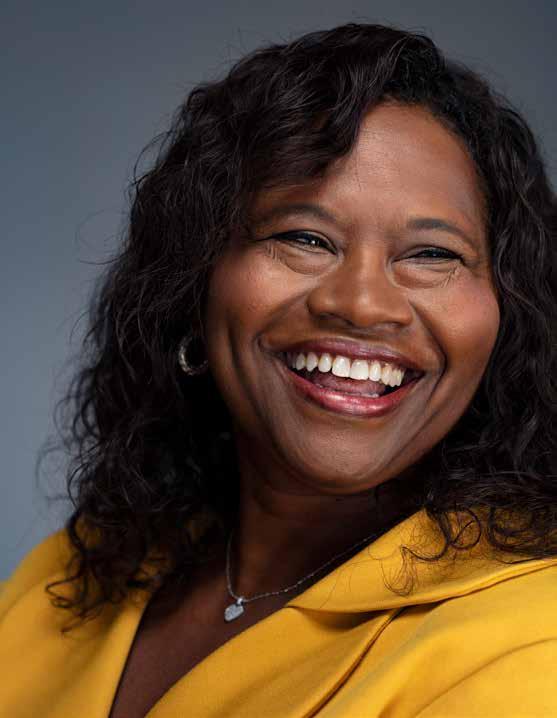
5 minute read
MEET
Q& A
Making Birth Better: Kimberly Gregory, MD, MPH
Advertisement
By Katie Sweeney
Kimberly Gregory, MD, MPH, is on a professional mission to make childbirth a safer and more fulfilling experience—not just for her own patients, but for all women. One of her tactics aims to convince hospitals to pay more attention to the type of maternity care women prefer.
The vice chair of Women’s Healthcare Quality and Performance Improvement in Obstetrics and Gynecology at Cedars-Sinai, Gregory recently led the Childbirth Experience Survey, which asked 2,700 expectant mothers what kind of support they desired during childbirth, and then followed up to see if they received it. Based on the findings, Gregory and her team developed a patient satisfaction model, now being studied in nine California hospitals. Here, she tells Discoveries about what pregnant women want, the future of labor and delivery care—and how her own childbirth experience made her a better doctor.
Did you always know you wanted to be a doctor? Pretty much. The story my family always tells is that I wanted to be a nurse, and my father told me I was too bossy and should be a doctor! That was around age 5. I’ve wanted to be a doctor ever since. I just sort of felt it as a calling. There was a moment when I thought I might want to be a teacher but, as it turns out, I’m a doctor who teaches because I’m on the full-time faculty, training residents.
What inspired your latest research? The groundswell of women interested in home birth is a reflection that they’re not getting what they want in a hospital. Childbirth is the No. 1 reason for hospitalization globally, and yet medical centers usually do not ask questions about patient satisfaction specific to childbirth. That was a glaring need. We also want to make sure birth is safe. A big national effort is underway to standardize maternity care because of the frightening rise in maternal mortality in the U.S. This country has the highest rate in the developed world—more than 700 women die each year from pregnancy or childbirth-related causes. Significant racial disparities persist, with African-American women nearly four times more likely to die during childbirth than white women.
What do women want when they’re having a baby? They want respect, and they want to feel safe. Communication is big. The more I talk to women, the less I am convinced that we do a good job of explaining what’s happening and why during the birth process. One of our findings was that, although women are the ones in labor, how their partners are treated is super important to them. Another issue is breastfeeding. Nationally, hospitals are trying to get to 85% of patients exclusively breastfeeding at discharge. Breastfeeding provides significant health benefits to the baby, but some patients—particularly educated, affluent, professional women—have decided not to breastfeed and sometimes feel harassed. If she says no, she means no!
How was your own childbirth experience? Did any of it … Weigh on me? I definitely think it made me a better doctor. You tend to give pat answers to certain patient complaints because that’s what you were trained to say. When you experience those issues yourself, you’re like, wow, that is some real pain! But I had a labor nurse who was really supportive. We watched TV and played cards, and she offered to give me a foot massage. I did not have an epidural. I’m a big proponent of physiologic labor, so I had to put my money where my mouth is. All my residents bet I wouldn’t make it, but I did.
What is the biggest challenge in improving the quality of maternity care? People are afraid of change. For example, there’s still a tendency to think that a caesarean delivery is safer, without taking into consideration that it is major surgery with risks to the mom. European studies show that going through the birth canal is protective for the baby in terms of their immune system and the subsequent development of a normal microbiome for their gut. In the U.S., the C-section rate for first-time, low-risk mothers is around 32%. The Centers for Disease Control and Prevention has set a national goal to reduce that to below 24%. At Cedars-Sinai we’re just slightly above that. So we’re getting there.
Beyond caring for your patients, what motivates you? I have ideas, and I feel a need to share them because they could make a difference. I’m fortunate to work with an extremely talented research team that can help me execute these ideas in a very scientific and rigorous way. My team has this saying: “Let’s just keep putting one foot in front of the other.” We believe in what we’re doing, and this kind of patient experience research is starting to become more accepted and valued. I think we’re on the right track.
What does the future of childbirth look like? The opportunity to have a home-like birth in a safe hospital environment—that is the future. I think there will be a broader use of midwifery, and more hospitals may start having affiliated birth centers; that model works in a lot of European countries. Also, I would like to see more one-on-one time with the nurse or midwife. Bonding with this person who knows what you’re going through is priceless.”
This interview has been edited and condensed. KIMBERLY GREGORY, MD, MPH
Vice chair of Women’s Healthcare Quality and Performance Improvement, Department of Obstetrics and Gynecology, director and fellowship director of the Division of Maternal-Fetal Medicine, and The Helping Hand of Los Angeles–Miriam Jacobs Chair in MaternalFetal Medicine
BORN AND RAISED Born in Gary, Indiana, and raised in Los Angeles from the age of 5, she is the first doctor in her family. Her father was an aeronautical engineer, and her mother was a special education teacher.
THE FAMILY WAY Married to Richard Casey, MD, an ophthalmologist at UCLA. Daughter Kendra, 21, is interested in pursuing medicine but as yet undecided on her career path.
RECHARGE TIME “I get my hair done religiously; that’s my treat! We go to church, and we love live music. We’ll do Hollywood Bowl, Staples Center, Microsoft Theater— any kind of live music.”
BEST-EVER CONCERT “Prince. Hands down. I don’t think I ever missed a Prince concert in any city I’ve ever been in. He once played every day for a week at the L.A. Forum, and I went five out of seven days.”


